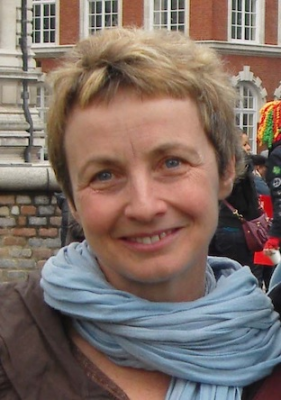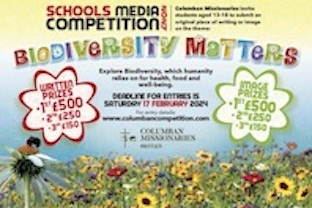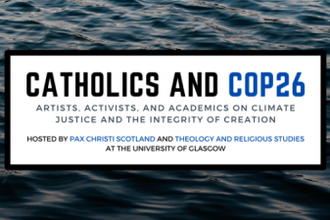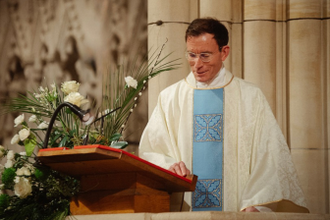Green light for 'game-changer' GCSE in Natural History

Mary Colwell
Oxford, Cambridge and RSA (OCR) a leading UK awarding body, announced on 21 April that its plans to introduce a GCSE in Natural History have been approved by the Department for Education. The new qualification aims to enable students to develop a rich understanding of the natural world: from their own local wildlife, environment and ecosystem to critical global challenges like climate change, biodiversity and sustainability.
OCR paid tribute to Catholic naturalist Mary Colwell, who has been spearheading a campaign to address the gap in natural history content in education. OCR has, "worked closely with Mary, supporter organisations, teachers, students, naturalists, conservationists and many others with an interest in nature and natural history to address this gap in education."
Mary Colwell has been key to linking religion with creation care. In 2008, as a Clifton Cathedral parishioner in Bristol, she organised a year-long series of events in Clifton Catholic Diocese that explored relationship to the natural world through the eyes of faith. 'Sound of Many Waters' stimulated environmental awareness in the Catholic Church in England and Wales. In 2009 she worked with the Alliance of Religions and Conservation and the United Nations Development Programme to organise a conference at Windsor Castle, 'Many Heavens, One Earth', which brought together faith leaders to discuss plans to protect the environment. HRH Prince Philip and His Excellency Secretary General of the United Nations Mr Ban Ki Moon presided over the event. More recently, she is the author of 'Curlew Moon' which highlights the falling numbers of the iconic Curlew, Britain's largest wadding bird.
OCR stated:
A brand-new GCSE in Natural History is set to be introduced, as the Department for Education backs our proposals for a new qualification. Natural History could be taught to 14 -16 years old from 2025. Pupils will develop a rigorous understanding of the natural world: from their own local wildlife, environment and ecosystem to critical global challenges such as climate change, biodiversity and sustainability.
The move is the culmination of a decade-long campaign led by naturalist Mary Colwell, with support from leading environmentalists such as the Eden Project's Sir Tim Smit, broadcaster Baroness Floella Benjamin, teenage conservationist Kabir Kaul, and 'urban birder' David Lindo.
It builds on years of research we've carried out alongside Cambridge University Press & Assessment, involving more than 2,500 teachers, students and environmental experts.
The UK government Secretary of State for Education Nadhim Zahawi will announce the new GCSE as part of the Department for Education's flagship sustainability and climate change strategy, which he is launching at the Natural History Museum in London on 21 April 2022.
MPs and peers from across the political spectrum, including the Green Party's Caroline Lucas and Conservative former teacher Caroline Ansell, have backed the qualification, which is seen as a major step forward in efforts to 'green the curriculum'.
OCR chief executive, Jill Duffy, said: "This GCSE is a wonderful opportunity for young people everywhere - from urban to rural environments - to study and connect with wildlife and the natural world. Deeper engagement with biodiversity and sustainability will equip generations of young people to understand their environment and grapple with critical challenges."
Tim Oates CBE, who leads Assessment Research & Development at Cambridge University Press & Assessment, said: "As climate change threatens our way of life, the education system must respond. A forward-thinking curriculum cannot remain static in a rapidly changing world. This is a visionary decision by Ministers. It shows how national qualifications can support vital social and economic priorities around sustainability - building on the National Curriculum in primary and delivering the awareness and understanding which the Dasgupta Review strongly recommended. It's been such a pleasure working with Mary Colwell on the detail and direction of this qualification, and with advisers such as Sir Tim Smit of the Eden Project, Bill Scott of NAEE and Beth Stone of the Natural History Museum, along with everyone on our Strategic Advisory Board."
Environmentalist Mary Colwell said: "A GCSE in Natural History could be a game-changer for the nature of Britain. Everyone will have the opportunity to be nature-literate, to learn about British wildlife and how it relates to the rest of the world, which is essential for a sustainable, green future."
Eden Project co-founder Sir Tim Smit said: "This decision is one of the most exciting things that has happened in education in the last thirty years. Seeing the world through the lens of the natural world will transform our wider understanding and empathy for the interconnection between all living things. I am so pleased that the Department for Education is demonstrating real leadership. Mary Colwell inspired us throughout to keep believing in her vision that this could be achieved."
The Urban Birder David Lindo said: "A lifetime's dream has finally come to fruition. Hopefully, our future leaders will now have a more balanced view on how to keep the world safe for us all."
Dr Doug Gurr, director of the Natural History Museum, said: "We have been delighted to work with OCR and such a wealth of experts in helping to shape what this exciting new subject could look like. Drawing on the Museum's vast experience, we know that once young people are inspired to engage with the world around them, they are far more likely to want to protect it. A Natural History GCSE is a huge step in helping to harness the passion young people across the UK are demonstrating for the natural world and in creating advocates for the planet."
Conservationist and wildlife writer Kabir Kaul, aged 16, said: "In a time where we face climate and ecological crises, and rising eco-anxiety in young people, a Natural History GCSE will give my generation the knowledge and practical skills they need to value and protect the environment around them. I am hopeful and optimistic it will give many of them the confidence to make a difference for the natural world for decades to come."
Dom Higgins of the Wildlife Trusts said: "We applaud this announcement and hope the new GCSE will inspire lots of young people, from diverse backgrounds to consider a career in conservation. For many teenagers gaping inequalities mean they don't get the opportunity to enjoy and understand nature or wild places. Young people have been at the forefront of action for a healthier planet, now they will finally have the chance to study our natural world, its wildlife and plants, our impact on it and how climate change and nature are interlinked."
Professor Phil Manning, Chair of Natural History at the University of Manchester, said: "The natural world consists of a rich language that if properly taught and understood has the ability to save the planet for future generations. The GCSE in Natural History is a major step towards a sustainable planet, with schools becoming hubs for student ambassadors. There is still hope for the future when knowledge and understanding of our planet is spread far and wide."
Field Studies Council chief executive, Mark Castle, said: "This decision marks an extraordinary moment for the future of environmental education in schools. It will give young people the opportunity to develop the skills, knowledge and passion that will enable them to help build a more sustainable future for themselves and others. With a much broader input from science, humanities and the arts it will allow them to connect and engage with the natural world in so many different ways."
Suzanne Moss, Head of Education and Learning at the RHS, said: "The approval of a Natural History GCSE is a major step forward in environmental education. When people understand the world around them they are much more likely to want to, and to be able to protect it. We are delighted that this diverse and inclusive programme considers a wide range of environments, from rural, to urban, to cultivated and will link more learners with the possibilities of the plant world. It will open up new avenues for young people in their careers and support the protection of the planet at an individual and organisational level."
Baroness Floella Benjamin said: "To understand the plight of our planet and how to rescue it is vital. So young people need to study natural history as early as possible in-depth, so that they can take GCSE exams and be equipped to save the world from catastrophe."
Lord Ralph Lucas said: "If we are to do better by the natural world we must bring up our children to know it and feel part of it. A Natural History GCSE will anchor all the DfE's efforts in this direction."
LINKS
GCSE Natural History - https://teach.ocr.org.uk/naturalhistory
Mary Colwell - www.curlewmedia.com/


















